- Role and Responsibilities: Agricultural chemists primarily work in research and development, focusing on the chemical aspects of agricultural processes. They study the interactions between chemicals, plants, and soils, and develop innovative solutions to improve crop production, soil health, and environmental sustainability.
- Education and Qualifications: To become an agricultural chemist, a minimum of a bachelor’s degree in agricultural chemistry, agricultural science, chemistry, or a related field is typically required. Advanced positions may require a master’s or Ph.D. degree.
- Knowledge of Agricultural Science: Agricultural chemists should have a strong understanding of various agricultural principles, including plant biology, soil science, agronomy, crop production, and pest management. They need to apply this knowledge to develop effective chemical solutions.
- Chemical Analysis and Testing: Agricultural chemists conduct chemical analysis and testing to assess soil fertility, plant nutrient content, pesticide residues, and other factors that affect agricultural productivity. They use specialized equipment and techniques to analyze samples and interpret the results.
- Formulating and Testing Chemicals: Agricultural chemists develop and test chemical formulations such as fertilizers, pesticides, herbicides, and plant growth regulators. They study the effects of these chemicals on plant growth, crop yield, and environmental impact.
- Environmental Impact Assessment: Agricultural chemists evaluate the potential environmental impact of agricultural practices and chemical applications. They assess factors such as chemical runoff, groundwater contamination, and air pollution, and recommend measures to mitigate negative effects.
- Research and Innovation: Agricultural chemists are involved in conducting research to discover new chemicals, improve existing formulations, and develop sustainable agricultural practices. They stay updated on the latest advancements in the field and apply them to their work.
- Collaboration and Communication: Agricultural chemists often collaborate with other scientists, researchers, agronomists, and farmers. Effective communication skills are crucial to convey research findings, recommendations, and safety guidelines to various stakeholders.
- Safety and Regulatory Compliance: Agricultural chemists must adhere to strict safety protocols when working with hazardous chemicals. They also need to stay updated on relevant regulations and ensure compliance with laws governing chemical use in agriculture.
- Career Opportunities: Agricultural chemists can work in various settings, including government agencies, research institutions, universities, agricultural companies, and consulting firms. They may also be involved in academia, teaching and mentoring future agricultural scientists.
Join 'Farmers Mag' WhatsApp Channel
Get the latest Farming news and tips delivered straight to your WhatsApp
CLICK HERE TO JOIN






